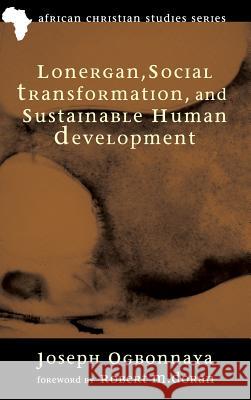Lonergan, Social Transformation, and Sustainable Human Development » książka
Lonergan, Social Transformation, and Sustainable Human Development
ISBN-13: 9781498262637 / Angielski / Twarda / 2013 / 202 str.
Lonergan, Social Transformation, and Sustainable Human Development
ISBN-13: 9781498262637 / Angielski / Twarda / 2013 / 202 str.
(netto: 166,98 VAT: 5%)
Najniższa cena z 30 dni: 172,43
ok. 16-18 dni roboczych.
Darmowa dostawa!
Description: Secular contemporary development discourse deals with the problems of societal development and transformation by prioritizing the human good in terms of vital and social values with the aim of providing the basic necessities of life through social institutions that work. While such an approach is profitable by promoting economic growth, it does not take note of other dynamics of social progress and development. Also, it fails to notice the consequences of development strategies on human flourishing, well-being, and happiness. Ogbonnayu argues for an integral approach to development by engaging in a fruitful dialogue between Bernard Lonergan's philosophical anthropology with contemporary development discourse, as represented in select theories of development, and in select principles of Catholic social teaching. It makes a case for social progress and transformation as emanating from human understanding. Also, it highlights the parts of Lonergan's theory that contribute to an understanding, specifically of his treatment of bias, and of the shorter and longer cycles of societal decline. In view of the reality of moral impotence and limitations, it considers the reversal of societal decline as possible through the supernatural solution of God's grace. Endorsements: ""This text offers a weighty theoretical prolegomena to the concrete implementation of sustainable development throughout the vulnerable economic areas in the world."" --John Dadosky, University of Toronto ""Joseph Ogbonnaya has produced a valuable book that contributes to the stock of knowledge both for theological studies in general and Lonergan scholarship in particular. . . . By retrieving and utilizing Lonergan's philosophical anthropology in this important discourse on development, Ogbonnaya has opened up a new area of intellectual activity, an area that if further investigated and developed holds a bright future, not only for theological education, but also for sociology and politics."" --Cyril Orji, University of Dayton ""This book brings contemporary development discourse and Catholic social teachings into conversation with Lonergan's philosophical anthropology. . . . I highly commend this book, which presents a focused and well-researched application of Lonergan's work to a contemporary context of relevance."" --Thomas E. Reynolds, Emmanuel College, University of Toronto ""This book . . . touches on themes related to economics, social justice, and cultural and historical differences, with core references to Africa and to the work of Lonergan on what it means to be human, on what makes for progress, decline, and redemption in human affairs."" --Therese Mason, Discovery Theatre for Adult Liberal Learning About the Contributor(s): Joseph Ogbonnaya is Assistant Professor of Theology, Marquette University, Milwaukee, Wisconsin. He is the author of Deepening the Christian Faith (2011) and coeditor of The Church as Salt and Light (2011)."
Description:Secular contemporary development discourse deals with the problems of societal development and transformation by prioritizing the human good in terms of vital and social values with the aim of providing the basic necessities of life through social institutions that work. While such an approach is profitable by promoting economic growth, it does not take note of other dynamics of social progress and development. Also, it fails to notice the consequences of development strategies on human flourishing, well-being, and happiness.Ogbonnayu argues for an integral approach to development by engaging in a fruitful dialogue between Bernard Lonergans philosophical anthropology with contemporary development discourse, as represented in select theories of development, and in select principles of Catholic social teaching. It makes a case for social progress and transformation as emanating from human understanding. Also, it highlights the parts of Lonergans theory that contribute to an understanding, specifically of his treatment of bias, and of the shorter and longer cycles of societal decline. In view of the reality of moral impotence and limitations, it considers the reversal of societal decline as possible through the supernatural solution of Gods grace.Endorsements:""This text offers a weighty theoretical prolegomena to the concrete implementation of sustainable development throughout the vulnerable economic areas in the world.""--John Dadosky, University of Toronto""Joseph Ogbonnaya has produced a valuable book that contributes to the stock of knowledge both for theological studies in general and Lonergan scholarship in particular. . . . By retrieving and utilizing Lonergans philosophical anthropology in this important discourse on development, Ogbonnaya has opened up a new area of intellectual activity, an area that if further investigated and developed holds a bright future, not only for theological education, but also for sociology and politics.""--Cyril Orji, University of Dayton""This book brings contemporary development discourse and Catholic social teachings into conversation with Lonergans philosophical anthropology. . . . I highly commend this book, which presents a focused and well-researched application of Lonergans work to a contemporary context of relevance.""--Thomas E. Reynolds, Emmanuel College, University of Toronto""This book . . . touches on themes related to economics, social justice, and cultural and historical differences, with core references to Africa and to the work of Lonergan on what it means to be human, on what makes for progress, decline, and redemption in human affairs.""--Thérèse Mason, Discovery Theatre for Adult Liberal LearningAbout the Contributor(s):Joseph Ogbonnaya is Assistant Professor of Theology, Marquette University, Milwaukee, Wisconsin. He is the author of Deepening the Christian Faith (2011) and coeditor of The Church as Salt and Light (2011).











